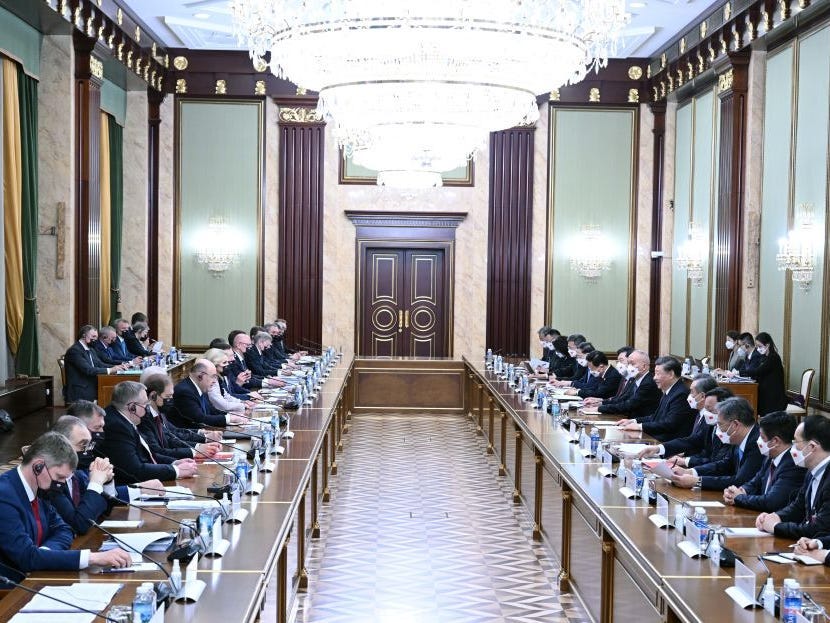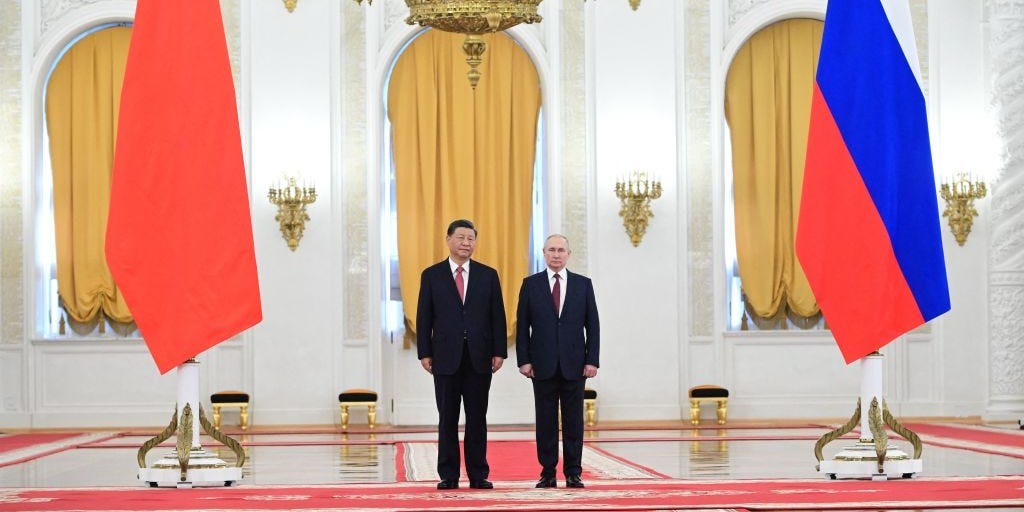- China appears to have cemented its dominance over Russia in a summit this week.
- Xi Jinping secured sweeping trade agreements after the summit with Vladimir Putin.
- In return Putin appears to have gained some photo ops, but little added concrete support in Ukraine.
During President Xi Jinping's first visit to Moscow since the outbreak of the war in Ukraine this week, Russia's President Vladimir Putin seemed keen to impress.
Putin is known for the power games he plays when meeting world leaders, sometimes keeping them waiting for hours and trying to intimidate them.
But in greeting Xi his welcome was effusive. A photo op in which the two posed between oversized Russian and Chinese flags seemed designed to trumpet the importance of their alliance.
Putin personally escorted Xi to his car at the conclusion of the summit on Wednesday, a cordial gesture observers say was virtually unheard of.
But his hosting efforts did not pay off, experts say — with Russia clearly shown to be the junior party as Xi reaped rewards from Russia and mostly did not reciprocate.
"The asymmetry of the Sino-Russian relationship has been growing increasingly apparent for some time," Ali Wyne, an analyst with the Eurasia Group in Washington, DC, told Insider. "And the summit has underscored it."
China hands Putin a lifeline
Putin is regarded as a pariah by much of the international community over the brutal and unprovoked invasion of Ukraine, and the Russian economy has been weakened by sweeping Western sanctions that isolated it from swathes of the global economy.
China though has refused to join the blockade, and has provided Russia with vital diplomatic, political, and economic support in the conflict.
—Sam Greene (@samagreene) March 21, 2023
It refrained from voting in the UN to condemn the invasion in the UN, sought to blame the West for fuelling the conflict, and has extended and deepened trade links with Russia.
China kept buying Russian oil — albeit at a hefty discount — and so helped keep the Russian economy afloat. China has been prepared to sell goods to Russia including jets parts and electronics jamming equipment which Western companies are forbidden from providing.
"China assesses that a stronger partnership with Russia is a pillar of its efforts to offset growing pressure from advanced industrial democracies, especially in the West," said Wyne.

Russia ties its economy to China
The summit featured a host of announcement of joint Chinese-Russian projects; but analysts characterized the deals as one-sided, giving Xi's China economic opportunity while doing little to strengthen Russia.
—Sam Greene (@samagreene) March 21, 2023
The US taunted Putin in the wake of the summit, with National Security Council spokesman John Kirby calling Russia is now the "junior partner" in the alliance.
The new projects include additional oil and gas pipelines from Russia to China (at prices China can determine) and new opportunities for Chinese companies to take over businesses in Russia left vacant by Western companies that pulled out.
The nations also agreed for China to take a key role in developing dilapidated regions in eastern Russia. Russia was offered no comparable stake in the far larger Chinese economy in return.
"Putin tells his people he's fighting for Russia's sovereignty. In truth, he's mortgaged the Kremlin to Beijing," tweeted Sam Greene, a director at The Center for European Policy Analysis and a professor at King's College London.
The US has accused China of planning to send weapons and lethal aid to Russia to stem battlefield losses in Ukraine. But after the summit there was little sign Russia has secured such an agreement, which would've marked a major triumph.
Instead, Xi tried to portray himself as an impartial peace broker, proposing a plan for a ceasefire in Ukraine.
While Putin was diplomatic about the plan, Kyiv has rejected it. Analysts told Insider that China is likely more concerned about burnishing its global image than actually securing an agreement to end the war.
China will likely seek to exert its new leverage over Russia to expand its global power, said Wyne.
He predicted that China could seek to pressure Russia to loosen its ties with India, one of China's key regional rivals, or even to accept a Chinese military presence in Central Asia, which Russia regards as within its sphere of influence.
"It is unclear that Russia would have much leverage to oppose such requests," he remarked.

